Dietitian Assistant
Entry Level Qualification
12
Career Fields
Allied & Para Medical Science
For Specially Abled




Career Entrance Exam
About Career
As a Dietitian Assistant, you will be working under the supervision of senior dieticians to assess, diagnose, and treat the nutritional problems of clients or patients. You may be involved in providing recommendations or giving suggestions regarding nutritional principles, dietary plans or modifications, food preparation, healthy eating habits, basic rules of good nutrition, and nutrition monitoring for improving the quality of life of your patients or clients.
Your work will be very crucial in helping presiding dieticians as you will be involved in conducting regular research, whenever you are asked to, related to the field of Food, Nutrition, and Health Education. Your research will be of use to you as well as your seniors. You should also keep yourself updated about trending food habits, the availability of new food alternatives, their benefits, etc.
Key Roles and Responsibilities
As a Dietitian Assistant, you will be engaged with one or more of the following roles and responsibilities: -
1. Making suggestions to clients and their families under the supervision of senior dietitians on nutritional principles, dietary plans or modifications, food preparation, healthy eating habits, basic rules of good nutrition, and nutrition monitoring for improving their quality of life.
2. Consult with personal physicians or medical officers to determine the nutritional needs, diet histories, and diet restrictions of clients and patients to provide them with nutritional counseling under the supervision of senior dietitians.
3. Educating and supervising workers who prepare and serve meals to patients in hospitals.
4. Participating and helping to organize dietetics and nutrition-related training programs or workshops etc. for target groups like healthcare personnel, medical students, or the general public.
5. Planning and conducting regular dietary, nutritional, and epidemiological (related to distribution and control of diseases) or related research to keep yourself updated.
6. Tabulating, assessing, and recording research findings and maintaining regular records, digitally on a computer or physically on paper.
PARTICULARS | DESCRIPTION |
Name | Dietitian Assistant |
Purpose | Supports Registered Dietitians And Nutritionists |
Career Field | Allied & Para Medical Science |
Required Entrance Exam | AIIMS BSC |
Average Salary | 50000 - 150000 Rs. Per Year |
Companies For You | Hospitals, Healthcare Centre, Food and Beverage Companies & Many More |
Who is Eligible | Class 12th Pass |
Career Entry Pathway
Class 8 in school – MES course for ‘Dietician Assistant’ or similar courses - MES course for ‘Hygiene Assistant’ or similar courses.
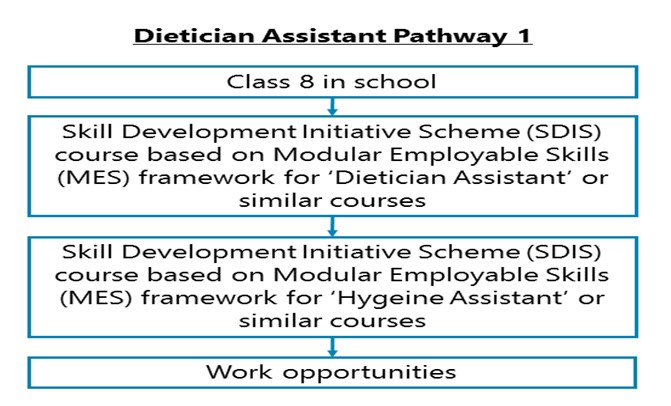
After completing Class 8 in school, you can enroll for the Skill Development Initiative Scheme (SDIS) course for ‘Dietician Assistant’ or similar courses based on the Modular Employable Skills (MES) framework under the Ministry of Labour and Employment of India. Then you can go for a higher level Skill Development Initiative Scheme (SDIS) course for ‘Hygiene Assistant’ or similar courses based on the Modular Employable Skills (MES) framework under the Ministry of Labour and Employment of India.
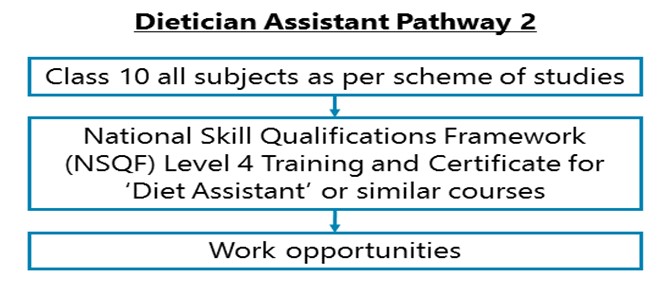
After Class 10, you need to undergo National Skill Qualifications Framework (NSQF) Level 4 Training and Certificate for ‘Diet Assistant’ or similar courses. The total hours of training will range from 600-1000.
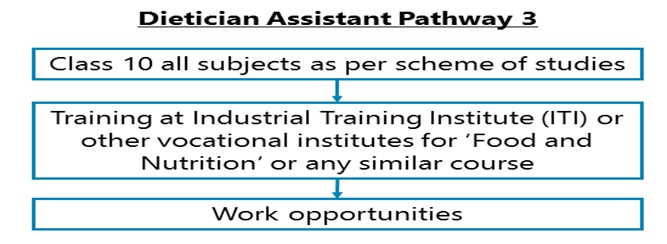
After Class 10, you need to undergo training at Industrial Training Institute (ITI), National Skill Training Institute (NSTI), Regional Vocational Training Institute (RVTI), National Vocational Training Institute (NVTI), Industrial Training Center (ITC) or other vocational institutes for ‘Food and Nutrition’ or any similar course. After completing this training, you will sit for the All India Trade Test (AITT) and you will get a National Trade Certificate (NTC) if you pass.
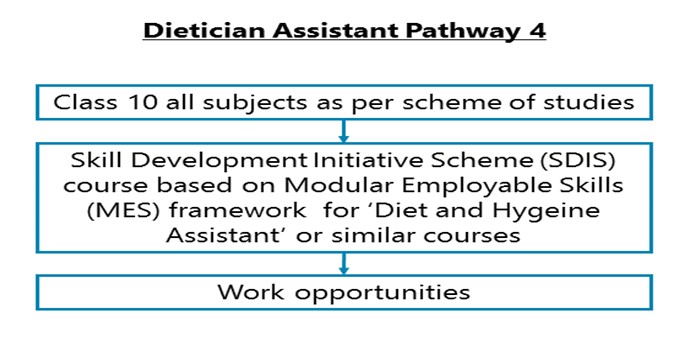
After Class 10, you can go for the Skill Development Initiative Scheme (SDIS) course for ‘Diet and Hygiene Assistant’ or similar courses based on the Modular Employable Skills (MES) framework under the Ministry of Labour and Employment of India.
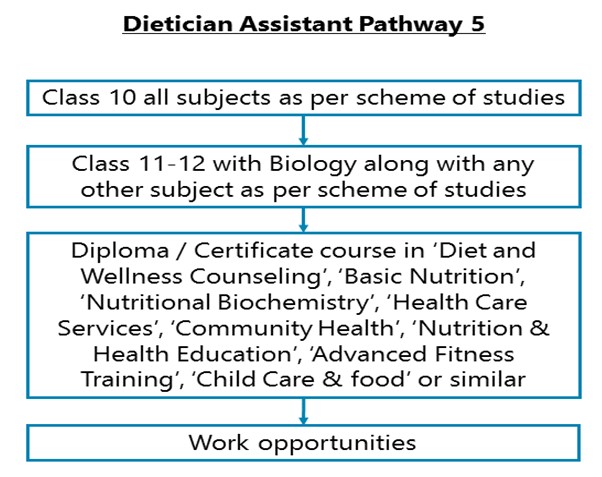
After Class 12, you can go for a Diploma / Certificate course in ‘Diet and Wellness Counseling’, ‘Basic Nutrition’, ‘Nutritional Biochemistry’, ‘Health Care Services’, ‘Community Health’, ‘Nutrition & Health Education’, ‘Advanced Fitness Training’, ‘Child Care & food’ or similar disciplines.
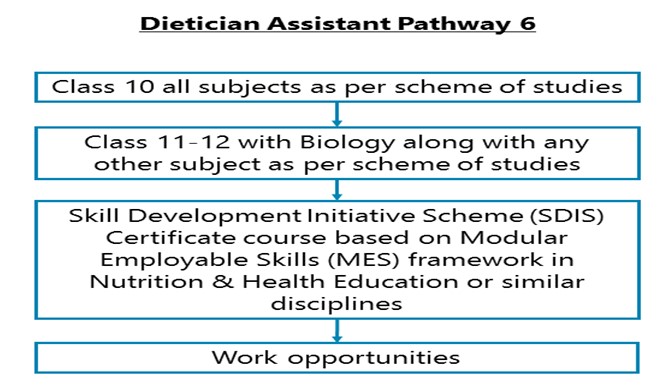
After Class 12, you can go for the Skill Development Initiative Scheme (SDIS) Certificate course in Nutrition and health Education or similar disciplines based on the Modular Employable Skills (MES) framework under the Ministry of Labour and Employment of India.
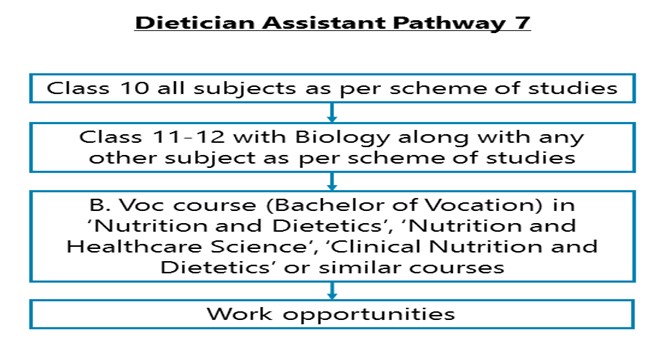
After Class 12, you can go for a B. Voc course (Bachelor of Vocation) in ‘Nutrition and Dietetics’, ‘Nutrition and Healthcare Science’, ‘Clinical Nutrition and Dietetics’ or similar courses.
Required Qualification & Competencies
After Class 8 in school, you can go for MES courses. After Class 10, you can go for:
1. ITI courses.
2. NSQF courses.
3. MES courses.
After Class 11-12, you can go for:
1. Diploma / Certificate courses.
2. MES courses.
3. B. Voc courses.
Various private and public educational establishments offer these or related courses:
1. Food and Nutrition
2. Food Chemistry & Nutrition
3. Food Science & Nutrition
4. Nutritional Physiology
5. Molecular Nutrition
6. Nutrition Sciences
7. Nutrition and Dietetics
8. Sports Nutrition
MINIMUM EDUCATION REQUIRED | MAXIMUM EDUCATION REQUIRED |
Under Secondary Certificate Programs for which the minimum eligibility is a pass in any class below class X. | Under Graduate Undergraduate Degree / Honours Diploma / Graduate Diploma (equivalent to a Degree) Programs for which the minimum eligibility is a pass in Higher Secondary / Class XII School Leaving examination. |
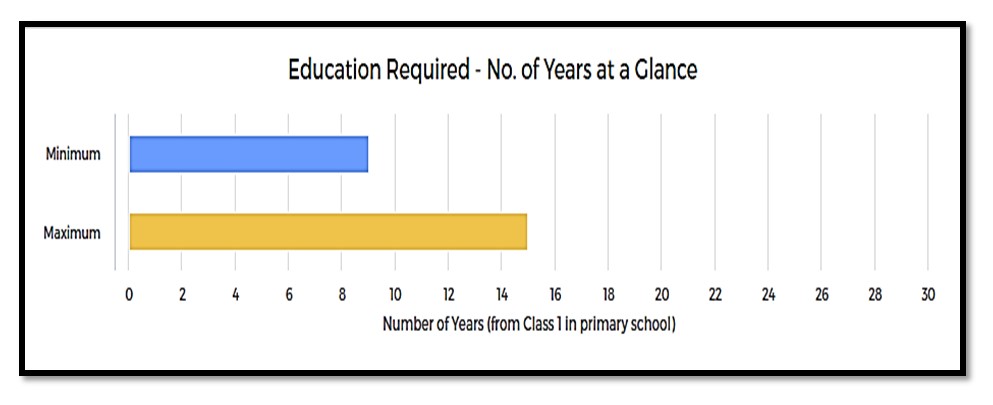
Competencies Required
1. You should have an interest in Investigative Occupations. Investigative occupations involve working with ideas and quite a lot of thinking, often abstract or conceptual thinking. These involve learning about facts and figures; involve use of data analysis, assessment of situations, decision-making, and problem-solving.
2. You should have an interest in Social Occupations. Social occupations involve helping or assisting others; these involve working with and communicating with people to provide various services; these may involve educating and advising others.
3. You should have an interest in Enterprising Occupations. Enterprising occupations involve taking initiative, initiating actions, and planning to achieve goals, often business goals. These involve gathering resources and leading people to get things done. These require decision-making, risk-taking, and action orientation.
4. You should know about Customer Service - how to provide customer services. This includes understanding customer needs, helping customers to use products and services, answering customer queries, handling customer complaints and grievances, and evaluating customer satisfaction.
5. You should know about Education and Training - various principles and methods of developing training or teaching curriculum, design of instructional methods, developing course materials, teaching, and instructing individuals and groups.
6. You should know about Healthcare Science and Services - different fields that are related to offering various types of healthcare services to people; and assisting physicians and surgeons to carry out diagnosis, treatment, and prevention of human diseases, ailments, and disorders. This includes knowledge of different practices apart from medicine which are used to treat and prevent human diseases or to provide holistic healthcare and wellness. This also includes knowledge about drugs and medicines.
7. You should have knowledge of Counseling - how to assess, evaluate, and otherwise understand human behavior, personality, abilities, skills, knowledge, motivation, attitudes, values, etc. and offer guidance and advice to people to help them deal with mental challenges and crisis as well as for deciding future courses of actions to make people happy.
8. You should know about Therapy - the principles, methods, and procedures for diagnosis, treatment, and rehabilitation of physical and mental dysfunctions or disorders in humans.
9. You should know Clerical And Secretarial Duties - various clerical tasks and procedures such as handling emails and phone calls, filling up forms, data entry, managing files, managing records, maintaining information databases, stenography, scheduling appointments, and other office procedures and general administrative tasks.
10. You should know Biological Sciences - plants and animals, their anatomical structure, cell structure, tissues, physiological functions, evolution, and all other related aspects.
11. You should have Active Listening Skills - Giving full attention to what other people are saying, understanding the points being made by others, asking questions, etc.
12. You should have Critical Thinking Skills - analysis of complex situations, using of logic and reasoning to understand the situations and take appropriate actions or make interpretations and inferences.
13. You should have Public Speaking Skills - Talking effectively to a large group of people or an audience or addressing the public at large in different settings such as conferences, seminars, meetings, etc.
14. You should have Service Orientation Skills - or a keen interest in helping and assisting people.
15. You should have Deductive Reasoning Ability - apply general rules and common logic to specific problems to produce answers that are logical and make sense. For example, understanding the reasons behind an event or a situation using general rules and common logic.
16. You should have Information Ordering Ability - arrange things or actions in a certain order or pattern according to a specific rule or set of rules (e.g., patterns of numbers, letters, words, pictures, mathematical operations).
17. You should have Inter-Personal Ability - build and maintain good relationships with others at workplaces and elsewhere.
18. You should have a Written Expression Ability - to communicate information and ideas in writing so others will understand.
Career - Job Opportunities & Profiles
You will get many work opportunities with various established Private as well as Government establishments, independent dieticians, hospitals, companies in the food and beverage business, diagnostic laboratories, quality control labs, NGOs, health clinics, or nutrition programs with FAO (Food and Agriculture Organization), WHO (World Health Organisation), UNICEF (United Nations International Children's Emergency Fund), etc.
Career Growth
With work experience, you can grow to become a Senior Dietitian, Nutritionist, Diet Counselor, Consultant, Nutrition Advisor, etc. However, progress into these roles will require higher qualifications.
Salary Offered
1. At the beginning of your career, you can expect about Rs. 4,000 – 15,000 or more per month.
2. With 3-5 years of experience, you can expect about Rs. 10,000-20,000 or even more per month.
3. With 8-10 years of experience, you can expect about Rs. 20,000 – 40,000 or even more per month.
4. After 13+ years of experience, you can expect about Rs. 30, 000 – Rs. 50, 000 or more a month.
5. In government hospitals or healthcare units, you will begin with about Rs. 15,000 a month. You will get yearly increments and you may look forward to earning about Rs. 40,000 – 60,000 a month after 15-20 years of experience.
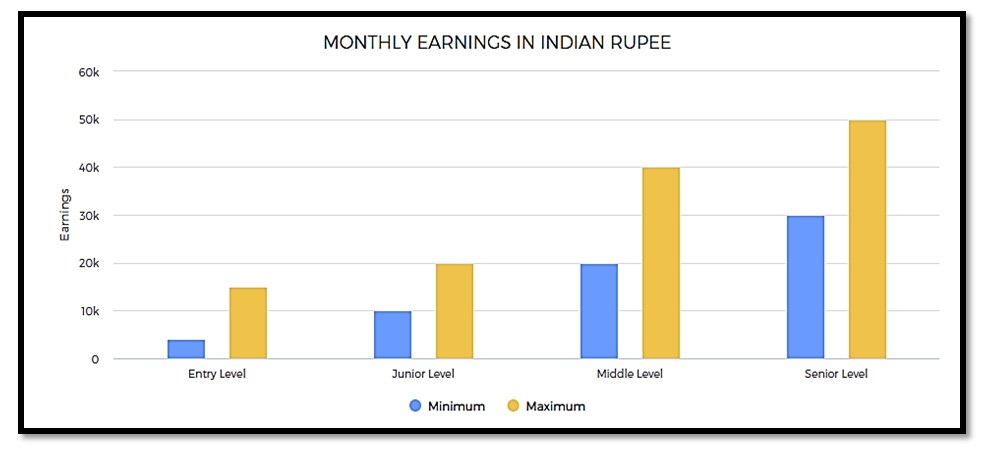
Monthly Earnings In Indian Rupee
Entry Level | Junior Level | Mid-Level | Senior Level | ||||
Min Earning | Max Earning | Min Earning | Max Earning | Min Earning | Max Earning | Min Earning | Max Earning |
4000 | 15000 | 10000 | 20000 | 20000 | 40000 | 30000 | 50000 |
1. Entry level: 0 - 2 years of work experience
2. Junior Level: From 1 to 12 years of work experience
3. Mid Level: From 5 to 20+ years of work experience
4. Senior Level: From 10 to 25+ years of work experience (there could be exceptions in some high-end technical, financial, engineering, creative, management, sports, and other careers; also shortly, people will reach these levels much faster in many careers and some careers, these levels will have no meaning as those careers will be completely tech skill driven such as even now, there is almost no level in a Cyber Security Expert’s job)
Work Activities
1. Assisting and caring for people - Assisting people in availing of services; taking care of people in different situations; offering help and services to others.
2. Decision-making and problem-solving - Analysis of data and information; evaluation of alternative decisions and results of decisions; taking the right decisions and solving problems.
3. Communicating with co-workers and others - Communicating with people in writing, verbally or otherwise inside your workplace and various other people who have professional relationships with your place of work including vendors, government officials, etc., or with people at large.
4. Getting Information and learning - Observing, hearing, and reading using computers, or otherwise obtaining information and learning from it.
5. Organizing, planning, and prioritizing tasks - Planning and organizing tasks to achieve work goals; prioritizing tasks to achieve goals and making the best use of the time available.
6. Working directly with people - Working directly with people to offer them products and services, assisting, etc.
7. Addressing grievances and resolving conflicts - Handling complaints and grievances to resolve; resolving conflicts among co-workers or others at the workplace or outside of your work.
8. Developing and maintaining interpersonal relationships - Developing professional relationships with co-workers and others outside organizations and maintaining good relationships.
9. Information processing - Searching, compiling, tabulating, calculating, auditing, verifying, or otherwise dealing with information processing including data entry, transcription, recording, storing, and maintaining databases.
Future Prospects
The future of this pathway looks like it is decently improving. The Healthcare Market in India has the potential to increase 133.44 billion US Dollars. Indian Government is willing to expand public health spending to 2.5% of GDP by 2025. The Healthcare Industry in India is one of the fastest-growing sectors and it is expected to reach $280 billion by 2025.
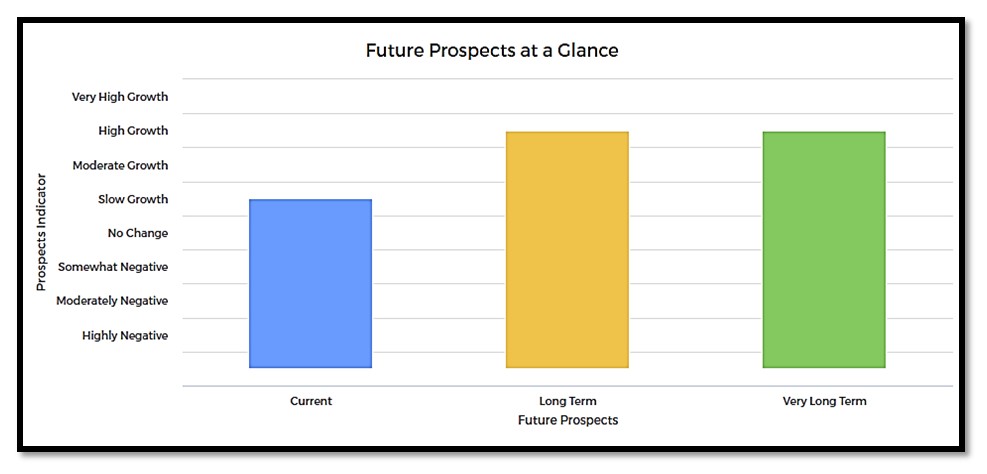
Future Prospects At A Glance
Current (0-1 year) | Long Term (2-5 years) | Very Long Term (6-10 years) |
Slow Growth | High Growth | High Growth |


